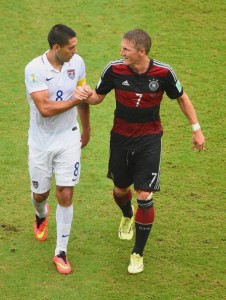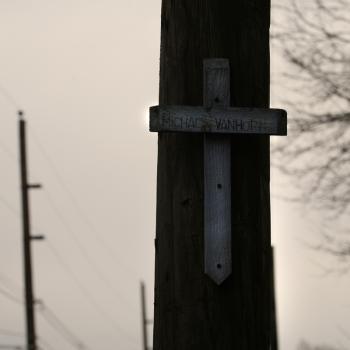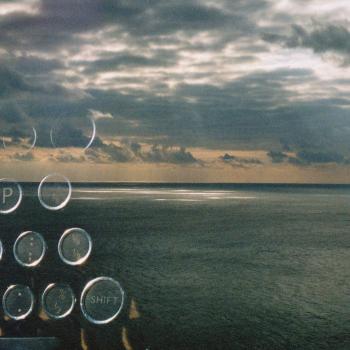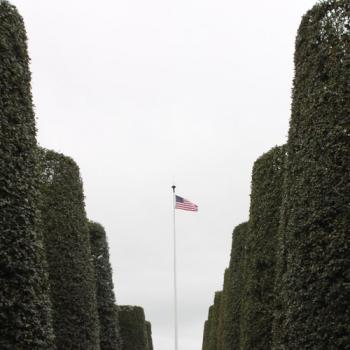 I met a friend in the local hipster bar to watch what was to be the U.S. team’s final game of the World Cup. An exciting game, we left with a loss that felt like a win. I was at the beach when the U.S. played Portugal and Germany.
I met a friend in the local hipster bar to watch what was to be the U.S. team’s final game of the World Cup. An exciting game, we left with a loss that felt like a win. I was at the beach when the U.S. played Portugal and Germany.
I was a serious soccer player in high school, planned to play in college until a senior-year leg injury (not on the field) took me out, so I was ready to watch some soccer no matter who was playing; I didn’t know about my family. They caught the excitement. We had not cheered this way for a sports team as a family ever before—even my kids who don’t watch sports on television and don’t particularly care for soccer.
But what I felt this time around watching the World Cup most strongly is a sense of pride in being American that I haven’t felt for a long time. It appears that we are having dealings with the rest of the world on equal and friendly terms. Americans on the field are simply men on the field, just like the ones from Ghana and Portugal and Germany, and every other nation. There is competition, but it is (mostly) friendly, and filled with admiration for a well-played ball no matter who makes the play. (My wife has complained that it is still a world of men, and I can’t disagree with that.)
Years ago I read an essay, and can’t remember where, that traced our national character through sport. When baseball became our national sport, our culture was agrarian, small town. Long lazy afternoons in the heat of summer, when the crops were growing on their own, spent playing ball in a dusty field. Baseball is a pastoral sport, the essay claimed, studied and cerebral. The rise of football marks a shift from this pastoral ideal to a heroic warrior ideal. A calm evening of balls cracking on bats and glove slaps can no longer compete with the bursts of speed and violence that is smash-mouth football.
What of soccer in all of this? Does it really matter in the United States? When a British commentator said during the Belgium game, “Things are at a standstill in the United States,” the bar burst out in laughter. Yet this bar was full with an audience (much younger than my friend and me) raised in soccer leagues.
Writing for Quartz, John McDuling observed that, “while soccer will never unseat baseball as the national pastime, or football as the national sport, it is finally settling into a sustainable place in the country’s psyche.”
Does our sport really mean anything about our character, or our relationship to the rest of the world? It is nice to think maybe it does, as Galia Press-Barnathan does when he writes, “The World Cup games indeed reflect and symbolize a sense of global fraternity and rejoicing in this popular and beautiful sport, and provide a stage for states to compete with each other and empower themselves by peaceful means.”
On the evening of the Portugal game, I stood on the deck enjoying the warm ocean breeze and a garbage truck rumbled up to dump the trash from the previous cottage residents. Two Latino men jumped out in blue coveralls and bounded around the truck. The dirty green garbage bin came up to his shoulders, stuffed to overflowing with white bags.
When one of the men pulled on the bin, an empty milk jug fell out into the road. In smooth, graceful movements, he rainbow kicked the jug and juggled it: one, two, three, four, five times, caught it in his hands and threw it into the truck. When he glanced up at me, I gave him a thumbs-up and he responded with a grin and a nod. The men jumped in the truck and drove on, but in that momentary exchange, a feeling of good will passed between us—it was the World Cup, we both knew, that had created it.
Sports fans in the United States generally get their sense of community by gathering in a stadium with people they don’t know for the most part to cheer for kids who are from somewhere else. The World Cup is different at least in that we can have this sense of national pride in our boys who played their hearts out and, as more than one commentator wrote, “left it all out there on the field.” It felt good to cheer for our boys.
However, as Laurent Dubois points out, “John Brooks, Jermaine Jones, Timothy Chandler, Fabian Johnson, and Julian Green.… All five are the sons of African-American servicemen and German mothers, and four of them were born in Germany (Green was born in Florida but moved to Germany when he was 2). They grew up in Germany and, crucially, learned to play in the excellent football academies that have made that country the global football power that it is.”
The United States is recruiting from its diaspora, which is “part of the massive and unequaled U.S. military presence abroad.”
After the Portugal game, my sister laughed and read aloud a comedian’s Tweet that the game almost made him want to learn the rules of soccer and find out where Portugal is. This made me think of another bit of humor I saw posted somewhere on social media a few years ago: “War is how the United States teaches its children geography.”
Fleeting and insubstantial as it might be, it still felt good to be the United States on the international stage, dealing with other countries big and small, “without,” as a man sitting at the bar beside me said, “feeling like we have to have our heels on everyone else’s throat.”
Vic Sizemore earned his MFA in fiction from Seattle Pacific University in 2009. His short stories are published or forthcoming in StoryQuarterly, Southern Humanities Review, Connecticut Review, Portland Review, Blue Mesa Review, Sou’wester, Silk Road Review, Atticus Review, PANK Magazine Fiction Fix, Vol.1 Brooklyn, Conclave, and elsewhere. Excerpts from his novel The Calling are published in Connecticut Review, Portland Review, Prick of the Spindle, Burrow Press Review, Rock & Sling, and Relief. His fiction has won the New Millennium Writings Award for Fiction, and been nominated for Best American Nonrequired Reading and a Pushcart Prize. You can find Vic at http://vicsizemore.wordpress.com/.











